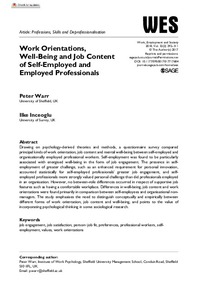Work orientations, well-being and job content of self-employed and employed professionals

2018
32
2
April
292-311
job satisfaction ; job content ; self employed ; professional worker
Quality of working life
http://dx.doi.org/10.1177/0950017017695043
English
Bibliogr.;Statistics
"Drawing on psychology-derived theories and methods, a questionnaire survey compared principal kinds of work orientation, job content and mental well-being between self-employed and organisationally employed professional workers. Self-employment was found to be particularly associated with energised well-being in the form of job engagement. The presence in self-employment of greater challenge, such as an enhanced requirement for personal innovation, accounted statistically for self-employed professionals' greater job engagement, and self-employed professionals more strongly valued personal challenge than did professionals employed in an organisation. However, no between-role differences occurred in respect of supportive job features such as having a comfortable workplace. Differences in well-being, job content and work orientations were found primarily in comparison between self-employees and organisational non-managers. The study emphasises the need to distinguish conceptually and empirically between different forms of work orientation, job content and well-being, and points to the value of incorporating psychological thinking in some sociological research."
Digital
The ETUI is co-funded by the European Union. Views and opinions expressed are however those of the author(s) only and do not necessarily reflect those of the European Union or the ETUI.